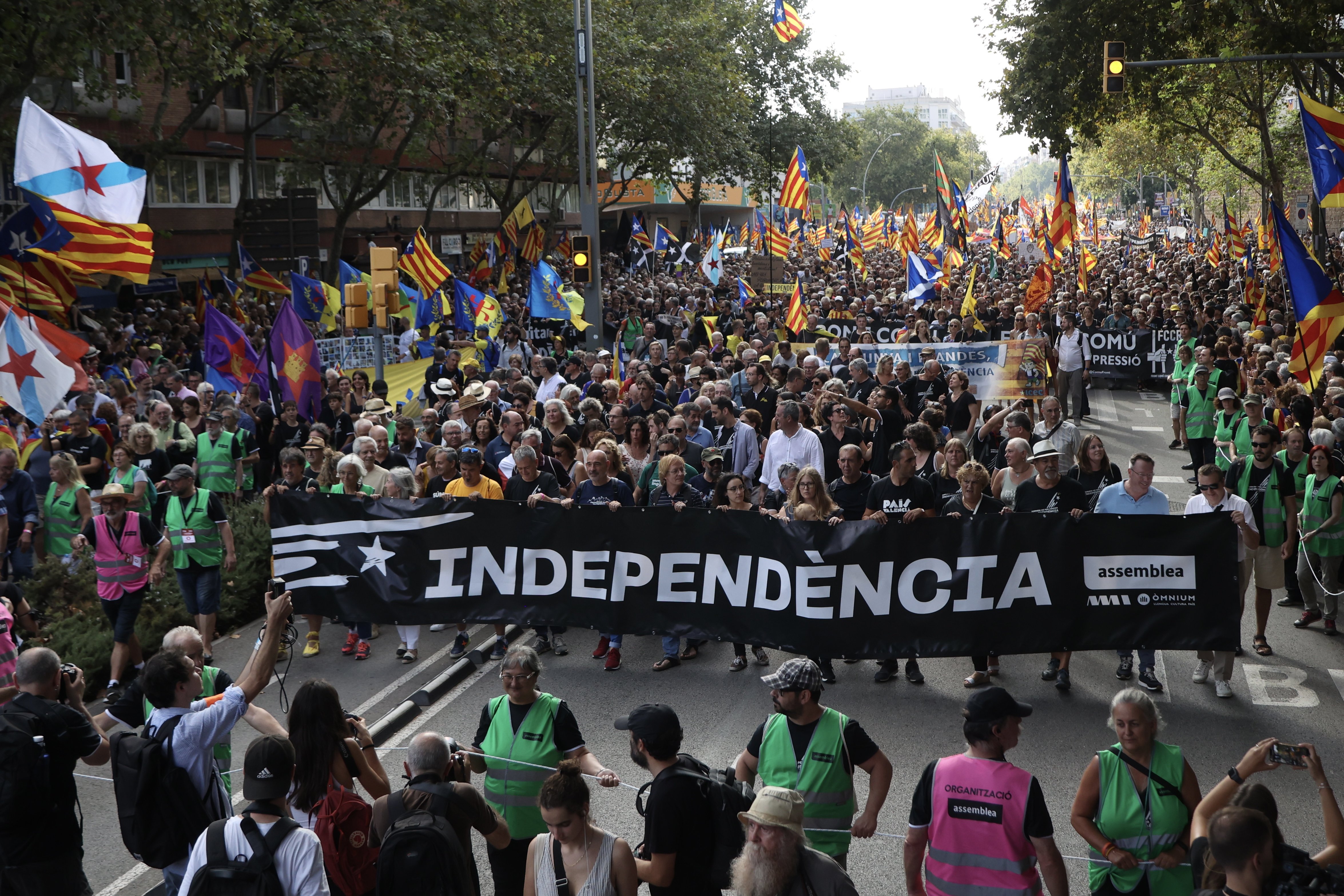The Catalan independence movement has done it again. In another historic day of protest action, the public have once again massively taken to the streets of Barcelona in the unitary demonstration for Catalan National Day, the Diada of 11th September. Moreover, they have done so in defiance of the demobilization factors in the current political context, with the independence process having stagnated, as well as the decision by the Catalan president and Catalan Republican Left (ERC) leadership to stay away from the unitary demonstration organized by the Catalan National Assembly (ANC). In spite of all this, it has been possible to significantly exceed the attendance registered last year, which according to the organization was 400,000 people. The latest 11th September rally brought together 700,000 people, according to the calculations of the ANC, and 150,000 in figures from the Barcelona Guardia Urbana.
Whatever the real figure, it was clear that the streets on the march route were jammed by an immense wave of people that filled much of central Barcelona. From four o'clock in the afternoon, Avinguda Paral·lel, which was divided into ten sections to allow all independence supporters to spread along its two kilometre length, began filling up. At 17:14 hours, a symbolic hour that echoes the year when Spain began the abolition of Catalonia's government institutions, the demonstrators began to march along the the capital's harbour front, via Passeig de Colom and Passeig de l'Isabel II, to end in front of the Estació de França train terminus, which is also just 200 metres from the Catalan Parliament. Here, from 6.30pm, the speeches were made.
"Independence or elections"
The president of the ANC, Dolors Feliu, gave an address that, as one could imagine, had the political parties and government institutions in its sights. Thus, despite not including any direct reference to the open conflict with the leadership ERC or president Pere Aragonès, due to their absence from the demonstration, she did not hesitate to make several critiques, precisely along the lines of the message that the pro-independence organization had announced as the theme of this year's mobilization. In a direct warning to the Catalan government, Feliu recalled the 52% of voters in the last Catalan elections who voted for pro-independence parties, and for that reason reiterated the need to follow through on the October 1st referendum result and apply it: that is, make independence effective. In the event that the government does not do this, Feliu recalled that the ANC plans to present a civic candidature in the next elections, commenting that the organization will not "always" be just complaining. "Either independence, or you call elections", she challenged, accompanied by loud applause from the public, who also demanded "resignations".
For his part, the president of pro-independence civil group Òmnium Cultural, Xavier Antich, followed a similar line to his words at the Òmnium event earlier in the afternoon, adding how contented he was with the high attendance at the march. "A lot of people went to work so that we wouldn't fill the streets, so that all of this would end in a dispute. But here we are. Who was saying that we would stay at home?", he said. He also defended the experience of the October 1st referendum, warning that on that occasion it was possible to get so far "because we knew where we were going and we were going there together". Along these lines, he opted to rebuild the commitments between the pro-independence parties and start a new cycle to culminate independence. "Allowing the battles to grow and becoming confused about who our enemy is: that's not an option. This is not about looking for culprits, it's about looking for complicities. We all want independence and we need everyone," he asserted.
'Botiflers' and traitors
The absence of the ERC and the president of Catalonia did not prevent the criticisms of demonstrators from being directed heavily towards the political parties. The large delegation from Together for Catalonia (Junts) was not targeted, but a multitude of banners and chants directed at the politicians were seen and heard. Thus, a banner read 'ERC, Junts and CUP. We won't vote for you again, traitors', while another similarly warned that 'The parties have betrayed us'. In fact, at the end of the political event, a group of people got onto the stage and displayed a banner with a strongly-worded slogan: 'Botiflers, history will judge you'. The 'botiflers' were those regarded as turncoats for taking the side of the Spanish Bourbon regime in its 18th century invasion of Catalonia.
The slogan of the ANC march was 'Let's came back to win: independence', and it was accompanied by chants for independence. The demonstrators, as usual, carried numerous estelada flags, and some with the black design signifying non-surrender, the same colour as the T-shirts designed by the organization this year. The demonstration was completely peaceful throughout its length, as well as good natured, with a few exceptions, such as the whistling that was heard when participants passed in front of the Spanish army's Captaincy General building, on Passeig de Colom.

